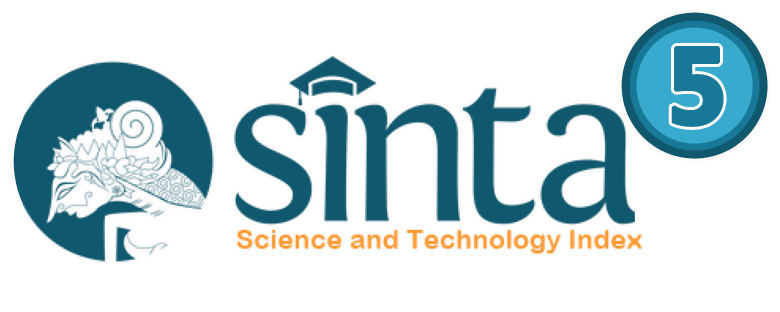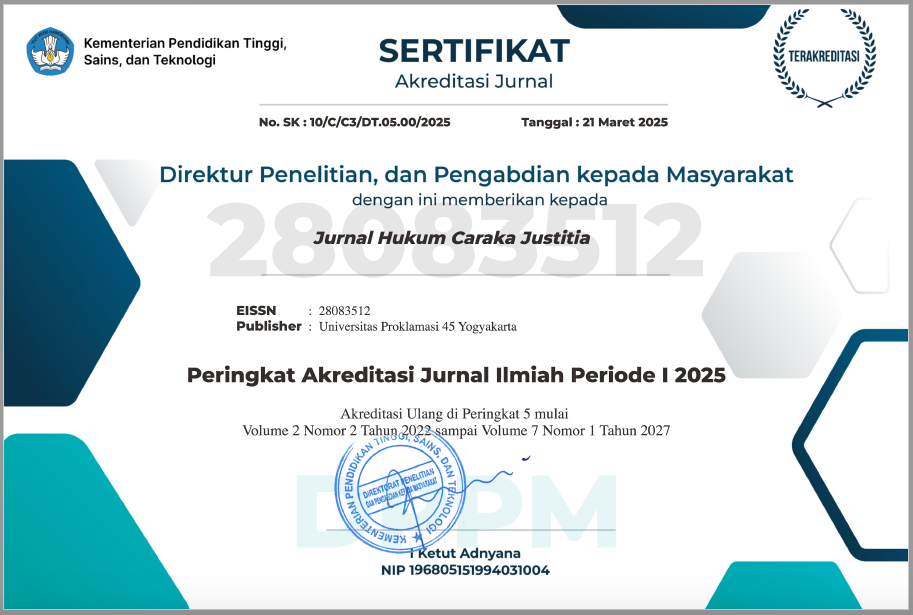Batasan Pertanggungjawaban PPAT Terhadap Ketidakabsahan Dokumen Kelengkapan Persyaratan dalam Sistem Hak Tanggungan Elektronik (HT-EL)
DOI:
https://doi.org/10.30588/jhcj.v4i1.1839Keywords:
PPAT Accountability, Document Invalidity, Electronic Mortgage System (HT-el).Abstract
This research aims to analyze the limits of PPAT's responsibility for documents completing the requirements in the Electronic Mortgage System (HT-el) as well as analyze the legal protection of PPAT as the person responsible for the validity and correctness of documents in the HT-el system. The research was conducted by the authors using a normative juridical writing method with descriptive analysis with a conceptual approach and a statutory approach. The legal sources used are primary, secondary, and tertiary legal sources using literature study methods and then analyzed by the author using systematic, extensive, and comparative interpretation. The limitation of PPAT's responsibility for the HT-el system is limited to the process of making a statement letter. If PPAT has carried out its duties and procedures by the provisions then it cannot be punished by Article 51 Paragraph 1) of the Criminal Code and according to Supreme Court Jurisprudence 385/K/Pid/2006. PPATs in carrying out their profession receive legal protection, namely preventive legal protection and repressive legal protection. PPAT's preventive legal protection in carrying out each of its duties and authorities must be based on the precautionary principle. Repressive legal protection: A PPAT can make efforts to defend themselves and receive legal assistance in the form of advice, input, or assistance during the investigation process.
References
Artikel Jurnal
Dewi, Anak Agung Isrri Ari Atu. “Aspek Yuridis Perlindungan Hukum dan Pemenuhan Hak Penyandang Disabilitas”, Pandecta 13, no 1 (Juni 2018): 50-62. https://journal.unnes.ac.id/nju/index.php/pandecta/article/view/ 13933.
Intansari, Mitia, & I Made Walesa Putra. “Kedudukan Kreditur Pemegang Hak Tanggungan Dalam Hal Debitur Wanprestasi”. Jurnal Kertha Semaya 5, no. 2 (April 2024): 1-7. https://ojs.unud.ac.id/index.php/ kerthasemaya/article/view/20941.
Isnaini, Hatta, Wahyu Utomo, & Hendry Dwicahyo. “Prinsip Kehati-Hatian Pejabat Pembuat Akta Tanah dalam Peralihan Tanah yang Belum Bersertifikat”. JH Ius Quia Iustum 24, no. 3 (Juli 2017): 467-487. https://media.neliti.com/media/publications/228987-prinsip-kehati-hatian-pejabat-pembuat-ak-ed0fa6e3.pdf.
Kantaatmadja, Komar. “Tanggung Jawab Profesional”. Era Hukum 3, no. 10 (1996): 1-13.
Margaret, Agata Tri Putri, & Sapardiyono. “Pelaksanaan Layanan Hak Tanggungan Terintegrasi Secara Elektronik”. Widya Bhumi 1, no. 2 (Desember 2021): 136-148. https://jurnalwidyabhumi.stpn.ac.id/index.php/JWB/article/view/ 14.
Memengko, Rudolf S. “Product Liability dan Profesional Liability di Indonesia”. Jurnal Ilmu Hukum 3, no. 9 (2016).
Mirlang. “Menimbang Paradigma Keadilan Hukum Progresif”. Jurnal Konstitusi 14, no. 2 (Juni 2017). https://jurnalkonstitusi.mkri.id/index.php/jk/article/ view/1424/317.
Orr, George W. “Fault as The Basis of Liability”, Journal of Air Law and Commerce 21, 4 (Januari 1994).
Saputra, Denny, & Sri Endah Wahyuningsih. “Prinsip Kehati - Hatian Bagi Notaris/ Ppat Dalam Menjalankan Tupoksinya Dalam Upaya Pencegahan Kriminalisasi Berdasarkan Kode Etik”. Jurnal Akta 4, no. 3 (September 2017): 347-354. http://jurnal.unissula.ac.id/index.php/akta/article/view/ 1807.
Septanti, Anggi Tamamia, Muhammad Khoidin, & Mohammad Ali. “Penyimpanan Asli Lembar Kedua Akta Pemberian Hak Tanggungan Setelah Berlakunya Hak Tanggungan Elektronik”. Jurnal Ilmiah Sosial Teknik 5, no. 2 (Juli 2023): 174-186. https://jurnalequivalent.id/index.php/jequi/article/view/ 154.
Umboh, Arnando. “Tanggung Jawab Pelaku Usaha Dalam Pemenuhan Hak Konsumen Menurut Hukum Positif Indonesia”. Jurnal Lex Privatum 6, no. 6 (2018).
Buku
Alvat, Pradikta Andi. Bantuan Hukum Konsep dan Praktiknya dalam Tata Hukum Indonesia. Ciracas: Guepedia, 2022.
Bakri. Pengantar Hukum Indonesia. Malang: UB Press, 2011.
Fasuza, Mayana Ranti, & Santika Tisni. Perlindungan Desain Industri Transformasi Konsep Ekonomi Kreatif Menuju Industri Kreatif Nasional Berbasis Desain. Bandung: PT Alumni, 2020.
Hermansyah. Hukum Perbankan Nasional Indonesia. Jakarta: Prenada Media, 2020.
Kelsen, Hans. General Theory of Norms. Canada: Oxford University Press, 1991.
Kosasih, Johannes Ibrahim. Akses Perkreditan dan Ragam Fasilitas Kredit Dalam Perjanjian Kredit Bank. Jakarta: Sinar Grafika, 2019.
Mayana, Ranti Fasuza, & Tisni Santika. Perlindungan Desain Industri Transformasi Konsep Ekonomi Kreatif Menuju Industri Kreatif Nasional Berbasis Desain. Bandung: PT Alumni, 2020.
Mukhidin. Seluk Beluk Lelang Hak Tanggungan. Pekalongan: PT. Nasya Expanding Management, 2021.
Raharjo, Satjipto. Ilmu Hukum. Bandung: PT. Citra Aditya Bakti, 2012.
Sulaksono. Teori-Teori Hukum Administrasi Negara. Surabaya: CV. Jakad Media Publishing, 2023.
Internet
Humas. “Dinamika Pertumbuhan Ekonimi Indonesia 2023 dan Proyeksi Tantangan 2024”. https://setkab.go.id/dinamika-pertumbuhan-ekonomi-indonesia-2023-dan-proyeksi-tantangan-2024/ (diakses April 15, 2024).
Peraturan Perundang-Undangan
Kitab Undang-Undang Hukum Pidana.
Undang-Undang Nomor 7 Tahun 1992 tentang Perbankan.
Undang-Undang Nomor 4 Tahun 1996 tentang Hak Tanggungan atas Tanah Beserta Benda-Benda yang Berkaitan dengan Tanah.
Peraturan Menteri Agraria dan Tata Ruang/Badan Pertanahan Nasional Nomor 2 Tahun 2018 tentang Pembinaan dan Pengawasan Pejabat Pembuat Akta Tanah.
Peraturan Menteri Agraria dan Tata Ruang/Badan Pertanahan Nasional Nomor 5 Tahun 2020 tentang Pelayanan Hak Tanggungan Terintegrasi Secara Elektronik.
Peraturan Pemerintah Nomor 24 Tahun 2016 tentang Perubahan atas Peraturan Pemerintah Nomor 37 Tahun 1998 tentang Peraturan Jabatan Pejabat Pembuat Akta Tanah.
Downloads
Published
How to Cite
Issue
Section
License
Copyright (c) 2024 Fitriya Nurmayuvita Buditama

This work is licensed under a Creative Commons Attribution 4.0 International License.
Authors who publish with JHCJ agree to the following terms:
Authors retain copyright and grant the JHCJ right of first publication with the work simultaneously licensed under a Creative Commons Attribution 4.0 International License that allows others to share (copy and redistribute the material in any medium or format) and adapt (remix, transform, and build upon the material) the work for any purpose, even commercially with an acknowledgment of the work's authorship and initial publication in JHCJ.
Authors are able to enter into separate, additional contractual arrangements for the non-exclusive distribution of the journal's published version of the work (e.g., post it to an institutional repository or publish it in a book), with an acknowledgment of its initial publication in JHCJ. Authors are permitted and encouraged to post their work online (e.g., in institutional repositories or on their website) prior to and during the submission process, as it can lead to productive exchanges, as well as earlier and greater citation of published work (See The Effect of Open Access).














